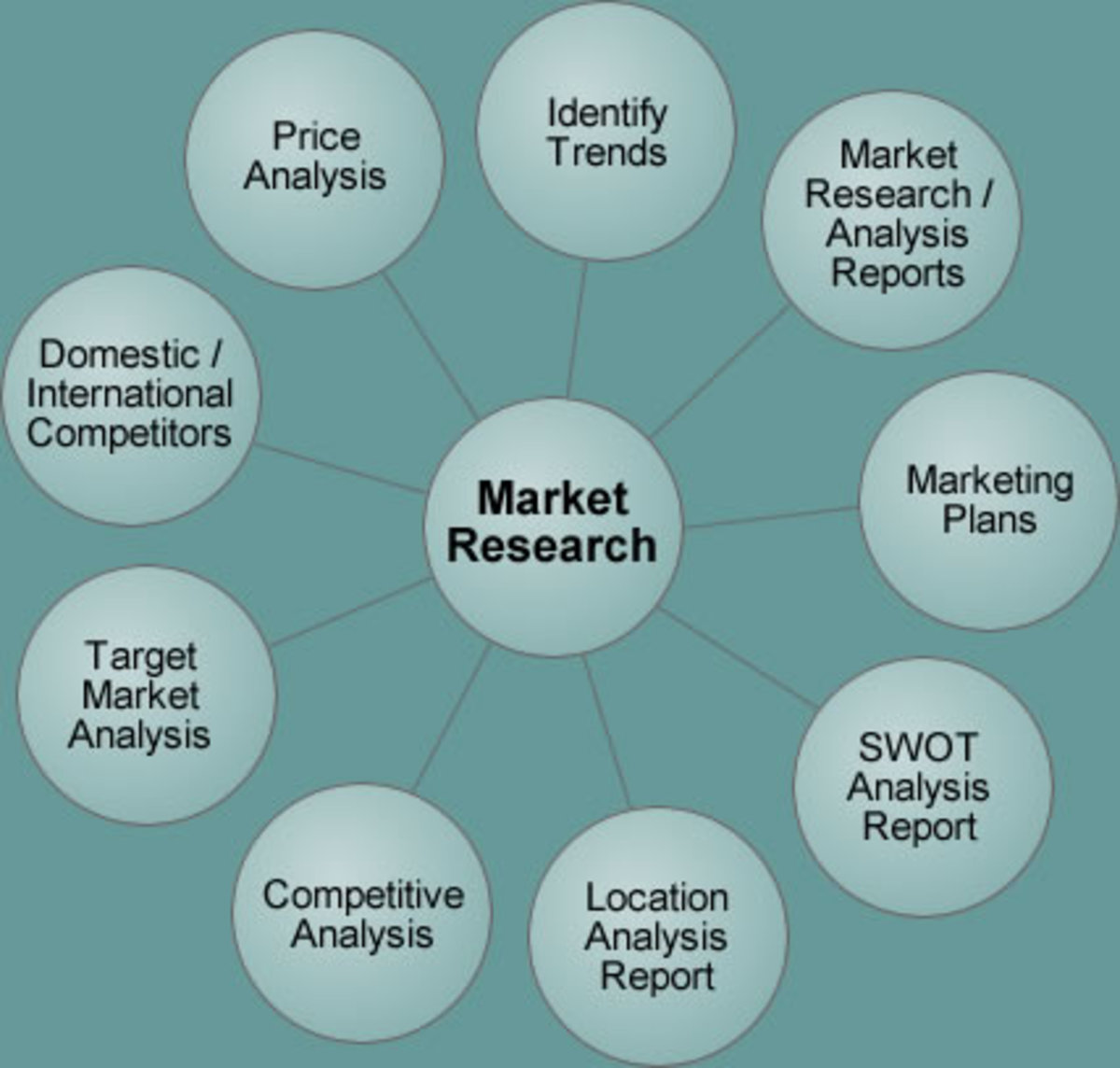Research Your Business Plan

Conduct Market Research for Your Business Plan
The kind of research you need for a business plan can sound like a truly intimidating project. How do you compile industry statistics, locate profit margins, and get the kind of data you need? Worse yet, how do you begin when you have no idea where to begin?
If you're preparing to launch a small business, you may know plenty about your industry but lack the information you need to get funding and market effectively. Don't avoid completing a business plan just because you don't have formal education on how to complete one! Also, don't let yourself get intimidated because you don't have the means to create the fancy-schmancy stuff you see on the Internet as examples: In reality, your report won't have to be pretty or elaborate in order to serve its purpose.
However, it does need to provide solid, reliable, accurate data that will educate investors about the soundness of your planning and warn you of potential problems before they happen.
I'm going to share some tips that I learned in my public relations courses and as a real estate practitioner that can help you locate the sources of information you need for whatever kind of business you'll be starting.
How important is it for entrepreneurs to conduct thorough research?
Market Research for Your Industry
There are two viable ways to complete market research: Hire someone or do it yourself. You may have to invest a bit of money either way.
Market research suppliers can provide the information you need quickly. Their experience and archived data allows them to pull together information for a specific industry in a fraction of the time it will take someone with no previous market research experience. Overview reports such as the ones available from FirstResearch are available for around $140. The disadvantage to using reports like these is that you'll still need to cull the data to include only what you need in your business plan. (The reports themselves can be included as part of your business plan's appendix as source material.)
If you do the work yourself, you can obtain much, if not all, of the data you need for free. However, you may opt to spend a bit to subscribe to sites that specialize in the time of information you're looking to find. One primary advantage of conducting your own research is that it gives you an opportunity to belong to sites that allow you ongoing access to this kind of information if you need it later. Also, it can help you grow your expertise about your industry and factors that influence it more thoroughly than simply reading someone else's report.
The University of Florida offers an excellent tutorial on the type of information that you'll need and quality sources for obtaining it. I have also found the Wall Street Executive Library's vast list of links helpful to locating and identifying data.
If you can spend up to a few hundred dollars, and if you don't plan to regularly conduct industry research, I recommend the first route - purchasing reports - and focusing your personal efforts on gathering the data you won't find in them - your local market data.
Are you working on drafting a business plan right now?
Market Research for your Company
Once you're armed with the industry reports that provide an overview of cultural, legal, and economic factors that flavor every company's outlook in your chosen industry, you're ready to examine more specific details about what will directly affect your business.
- Who are your direct competitors?
- How much of a risk do they pose?
- Who will your customers be? Are there enough of them in your area?
- How can you reach them most effectively?
- Will your service or goods satisfy them at a price they're willing to pay?
Hopefully, the industry data gathered has provided some information about the types of consumers who want what you're offering, but that's not always the case. For instance, during a campaign I worked on to attract tourists to Jekyll Island, Georgia, we used a lot of data from the Travel Industry Association of America (TIAA) and the American Automobile Association (AAA) because they had a great deal of rich data about why people travelled, when, and for what reasons. However, when we discovered that Canadian travellers, one of Jekyll Island's large target audiences, was under-represented in the American sources of information, we were forced to find ways to gather information on seasonal travel by foreigners.
Internet searches can take a lot of the pain out of doing your local research. If you want to open a clothing store that offers only imported women's clothing, for instance, you'd conduct a couple of Google searches that include the name of your area in order to compile a list of competitors. In this case, you'd probably search for "imports in Kansas City" (of course, if you're in another city you'd use your own city's name" and "women's clothing Kansas City."
Similarly, you can use Google Maps or another mapping website to determine the distance of your competitors to the location from which you'll be operating your business. Your industry research should have already uncovered the typical service area for your business: An amusement park will lure customers from a far greater geographic distance than an automobile dealership, for instance. A convenience store would have a much smaller range. Your maps, combined with industry data, will reveal a great deal about your business's viability.
Another piece of information your industry data should have provided is the demographic of your customer - sex, age, income, family structure, and so on. You wouldn't want to sell skateboards to members of the local retirement community, after all! Now that you have your information on competitors and the geographic area that will support your endeavor, it's time to make sure the customers are there, too.
- Write a Business Plan for Your Small Business
Entrepreneurs who want to avoid problems or who plan to raise money from investors or lenders need to have a business plan that includes certain types of information. This article provides an overview of what should be in every business plan. - High Demand Jobs Profile: Marketing Research
Marketing research careers are growing faster than average, pay well, and offer great working conditions and benefits. This article outlines all you need to know to get into this field. - Research Definition|Types of Research Methods
What is research?Re-search a particular thing or a concept in order to find or to verify it that may either lead you to a novel idea or help you to re-enforce the concept that you are researching.There a several types of research methods that you wil
Where to Find Local Market Research
- Census bureau data is a gold mine for providing details about the kind of people in your target area: household structures, income, age groups, and education levels can all be found here. When combined with the information you've already uncovered about who buys products or services like the one you're offering, you'll be able to calculate financial projections more effectively. If twenty percent of teens ride skateboards, and of those, twenty percent buy three per year, then recognizing that your targeted geographic area consists of 10,000 teens allows you to calculate a maximum of about 1200 sales per year - which may not be enough to sustain your business and would alert you that in order to be successful, you'll have to find ways to target a greater number of teenagers, a different product mix, or to effectively supply a larger geographic area.
- Specialty associations at both the national and local level may conduct research that is helpful to you.
- Chambers of Commerce can often provide statistics about factors that can affect your local marketplace.
- Strategic partnerships can be a vital part of your planning and help you gather important data. For instance, if you're interested in opening a child care center, talking to local schools may highlight an underserved niche for after-school daycare that you can capitalize on and possibly statistics of latchkey children in the district. Talking to potential strategic partners can help you do two things at once - obtain data and identify opportunities.
- Government Department of Transportation offices frequently have traffic counts for main thoroughfares. For any business that relies on local traffic, this is key information that should never be left out of a business plan.
- Real estate companies that offer commercial listings often have data that's important for your business. You'll be able to get some of this information if you talk to a Realtor about the kind of property you'll be looking at leasing or buying, and getting their promotional packages for existing commercial listings. This can reveal traffic counts, how much revenue was generated by a location, and what costs you can expect when you lease or purchase property for your business.
- In limited cases, telephonic or Internet research may be helpful, but it's expensive for a small business. Let's say you plan to open a real estate office, but another company dominates the market and you aren't sure you can compete. Hiring a research firm to put together a survey designed to highlight whether that company is well-liked or if they have a weakness you can use to your advantage might be critical for evaluating whether you stand a chance of gaining adequate market share. Note: Hiring a firm when it's necessary to complete this step is important because it's incredibly easy to bias results and get bad information if you don't have thorough knowledge of how to prevent biased results.
- Finally, any additional data that relates to your target audience's habits can be important. Let's return to our skateboarding teens for a moment. If there is a skate park in your area, it may be frequented by your target market or it may have fallen out of favor. You can obtain information that's not available anywhere else by completing surveys of the people you're hoping to reach in order to identify what they'd like to see and whether they'd use your goods or services.
Conclusion
Conducting research can be a complex task. Hiring specialists can be well worth the price, but it's possible to keep costs lower and boost your own expertise by understanding where to find the information you need.
Once you've got thorough research, you'll be able to quickly put it into your business plan. Your research will be the foundation for your SWOT report, your financial projections, and will influence your startup and operating expenses.






